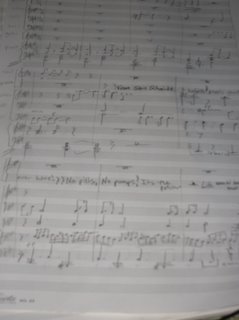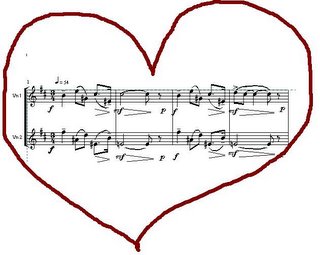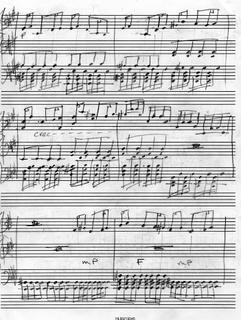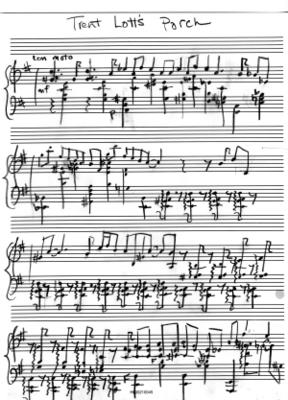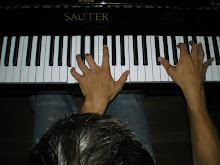.......apologies in advance. Art in Definition... part deux.Art is expression... But does that mean all expression is art? This is the trickiest of all questions, and there are many, many different opinions on what is and isn’t art. But if we accept this most liberal, most generalized idea, then everything can be treated as an art- these words, language itself, gestures of any kinds and ideas of all kinds. There are many working artists who see this as the only definition of art, so consequentially, everything we say and do is an art.
The 20th century has been practically nothing but a series of avant-garde artists who've attempted, in one way or another, to undermine society's pre-conceived notions of what art is. There were the first abstractionists and atonalists who abandoned the notion of representation and tonality as the definition of visual arts and music, later there were conceptualists of all sorts who denied that paint or color or form were necessary in visual art or that harmonic tones are necessary in music. There are tons of examples of this, as this is at the very core of what it is to be avant-garde.
I have not finished my thoughts on the definition of art, but as it is, it reads:
Art is deliberately organized expression- so all those phone conversations and hand gestures you make while eating, are out - they aint art, but if you plan it out, it is.
Now what is also necessary is that given that definition, we need to make sure we don’t continue to associate art with anything "high" or "low". Those boundaries don’t exist... yet (or will they ever?) who knows...
"Its all Subjective"In art, my greatest enemy is the phrase
"its all subjective". This cliché has been passed from one person to the next and is nothing short of a mental cop-out.
If art is all subjective, and therefore there is no rational basis for judging art, then a pile of vomit in an art gallery
would be just as important as the mona lisa, that is to say,
there would be nothing that makes the mona lisa better in any way than a pile of vomit. This is, essentially, nihilistic. This concept gives no justification for any type of analyzation, because in the end, there are no "good" or "bad" ideas, those terms are based in subjectivity. This thought is rooted in the idea that there is no "objective reality"- an idea which may be true, and thus there is no "objective good" (that is, something good beyond the human mind frame and society), but it does not mean what is "good" does not exist- it exists as a necessary social and mental construction. To deny this is to say that there is nothing "wrong" with anything at all, or any behavior or ideas, which means that you've clearly fallen into nihilism.
So whats the answer? I think we can all agree that intelligence and thoughtfulness are inherently good qualities (actually, the nihilist will deny this too) and there are rational arguments laying around somewhere for why intelligence is important, but i think its rather pointless to do that now, so lets move on.
A Basis for Criticism.Does an artist value thoughtfulness and intelligence in their art? This is the primary question in judging a work. If we value it ourselves, we can continue, if we dont, we're a dumbshit nihilist who shouldn’t be reading this (or anything for that matter).
Does an artist value expression or not? (expression being the core to all that is art) Does the artist value art at all (including their own)? or do they not? This is the basis of what we can call our
criteria for judging a work of art. Artists most likely value something, whether its looking cool and stylish or expressing some form of internal existential crisis, if they didn’t value anything, again, they'd be a ...dumbshit nihilist.
Generally in art, we don’t have to question an artist's intent as being intelligent, as we make the sometimes
dangerous assumption that the artists we're dealing with are intelligent human beings and consequently, they
value intelligence. But obviously this is sometimes not the case (Brittany spears, anyone?)**.
A criteria, as i said before, is a method of understanding the values of an artist, and in debate the debater has a criteria they're working in, and values which they consequently uphold as part of that criteria. Art is very similar to debate in this manner. They are both to be judged on some criteria, implicit or explicit, and, just like in a debate, you can attack an artist's criteria for (probably not) valuing something.
So there you go- the first, and probably strongest method of criticism: the analyzation of an artist's art-values and a criticism of those particular values. This means that it doesn’t matter on the date or the genre in order to critique something.
**Im not saying that Brittany spears isn’t intelligent, im just saying that she clearly doesn’t value intelligence very highly in her art...(if at all).
_______
Ok, so there’s some more crap for today. Its kinda patched together from older texts and stuff i just wrote, so there may be some confusion, but hopefully its not too awful. As always, feel free to criticize away. God knows i need it.
